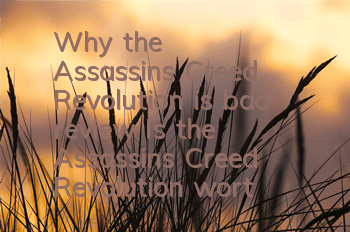If you have some research on world history, I think you should know how far-reaching the influence of the French Revolution on modern civilization and the history of thought. In addition to studying hard, it is possible that no second game company can do this except Ubisoft, except for Ubisoft, can do it? Just for this, we should give Assassin's Creed: The Great Revolution a little applause. However, this work has been rated as the worst work in the series by many players. Why is this true? This time let’s talk about this classic "Assassin’s Creed: The Great Revolution".
The overall visual effect is amazing, the soundtrack is breathtaking
At some levels, Ubisoft did not disappoint Assassin's Creed fans. This Assassin's Creed series released at the end of 2014 relies on the performance of the next-generation console and successfully constructed Paris, France at the end of the 18th century, during the Great Revolution. Let the players follow the footsteps of the protagonist Arno and walk together on the streets of Paris to experience the social momentum brought about by the Great Revolution. Speaking of the various violent scenes on the streets of Paris back then, and struggles between the Jacobins, the royalists and the independents can be seen everywhere. Various demonstrations and homicide scenes can be witnessed "with your own eyes" in every corner of Paris.
So, in terms of creating the entire game atmosphere, I want Ubisoft to successfully create a virtual Paris that is extremely turbulent and full of anger. Although IGN's game reviews mention the appearance and clothing of pedestrians on the street are too high, thus weakening the authenticity of virtual Paris. But in terms of my personal gaming experience, I don’t feel the problem of characters’ repetition. On the contrary, when I followed Arno into Paris at the end of the 18th century, I saw the various aspects of life in the great era: radicals traveled on the spear, individual groups with different political ideas accused each other of murder, and petty citizens worked hard to survive in this uneasy years. To be fair, Paris, the game stage this time, can be said to be the most vivid and textured one I have played in the Assassin's Creed series.
Indeed, this French Revolution is filled with the atmosphere of returning to the second generation of Assassin's Creed. The most obvious of which is that Ubisoft cleverly incorporates the main theme of the second generation into the theme song of the Revolution. Speaking of soundtracks, the soundtrack of the Great Revolution is one of the most touching game music I have ever heard in my gaming career. In addition to the main theme that reminds people of the legend of Egio, many of the songs in the game are even written with the shadows of Vivaldi and Rachmaninov; even if you don’t play the game, you will find it exciting just by listening to the soundtrack.
Smooth parkour system
However, since the number of people on the street is the largest and most active in Assassin's Creed, Arno's movement route lasts for most of the time in the buildingI really like the rooftops. After all, assassins should have acted like this, right? Isn’t one of the dogmas in the Brotherhood that we “hide in the city”? Therefore, it is just just right to avoid the crowds all over the street. Speaking of this flying eaves and walls, I also appreciate the parkour system of this game.
Players who have played all previous games should know that in previous Assassin's Creed, they only had the setting of climbing up, while climbing down was relatively weaker. But in addition to making climbing more smoothly, the Great Revolution finally designed the instructions to climbing down. This made Yano's actions between the beams and roofs of buildings in Paris even more neatly, and also allowed me, as a player, to taste the parkour interest in Paris, France at the end of the 18th century. This kind of gameplay of flying over the eaves and walls has never been performed after the end of the Egio trilogy.
First of all, Assassin's Creed Third Generation stupidly used climbing trees instead of climbing walls. Even in towns, in addition to the height and quantity of houses that cannot make people climb to the ground, Ubisoft also arranged dense gun-carrying guards on the roof, so you can still climb the walls, but the smoothness is severely folded in half and then in half. This nonsensical design undoubtedly requires players to be obediently on the road.
The era background is magnificent, but the plot focuses on the tragedy of small characters in the big era
Just like the American War of Independence, the French Revolution was also a major historical event that had a profound impact on future generations. The ability to set the game background at this crucial historical time point shows that Ubisoft still has its grand side in the plot material. Looking back, the French Revolution is the most powerful game background, but the plot is mainly focused on Arno's road to revenge. Many commentators said that such a single-oriented plot setting makes the depth and color of the protagonist Yano relatively weak. I agree with such criticism during the game, but after passing the main line of the game, I have a slightly different view.
It's like the French Revolution. Ambitions and military strategists all thought it was an opportunity to increase political value and bargaining chips. However, compared with the first-level nobles and the second-level priests, as the third-level peasant and labor poor class, the reason why they stood up to fight for the simplest right to survive. Unfortunately, such a simple motive, under the instigation of various groups, turned into turmoil and uneasy across the country: republic, terrorism, autocracy, and imperial restoration took turns to be staged from 1789 to 1799. During the Jacobin dictatorship, between 1791 and 1794 alone, the Guillotine cut off more than 70,000 so-called "counter-revolutionaries", including one of its designers: Louis XVI.
The protagonist Yano and supporting role Alice are also a face among the countless people. The two who represent the positions of the Assassin and the Templar respectively are also in this great era and are also in the space-time and time of the two secret societies fighting each other.The two of them have the depression of separation from life and death in their future encounters. In fact, as long as Ubisoft seizes the sorrow of such a small person in the big era and describes the feeling of loneliness that cannot be controlled by others in the world, I believe that the assassin of Yano will have more depth and humanity.
The character portrayal is indecently delicate
Like all living in this chaotic era, the protagonist Arno, who is as dandy as Egio, did not deliberately intervene in the French Revolution, or the struggle between the assassin and the Templars. The reason why he joined the Assassin Brotherhood was that he only pursued revenge on his father, and his two fathers' revenge: his biological father as the assassin and his adoptive father as the leader of the Knights Templar. This was clearly stated when he first joined the association, so if the commentator just kept talking about his revenge, he would be rude. However, Ubisoft does have room for improvement in establishing the depth of the character, especially if it expresses the contradiction between the protagonist Arno and the beliefs of the Templar, wouldn’t it be more beautiful?
When it comes to Assassin and the Templar, I think in addition to the first and second generations making clear barriers between the two, I have clearly felt that Ubisoft deliberately made these two seemingly incompatible secret societies in a relatively vague way. For example, when the prologue of the Third Generation ended, we discovered that the master Helson Kenwaygen Templar came. The middle and late sections are staged again, like Shakespeare's play, the scene where the assassin's son and the father of the Church are in a showdown. This expression of no obvious black and white is even more obvious in the black flag. Especially when players look at the dispute between the two major societies through Edward, the assassin who became monks halfway through, they will find that in fact, the assassin and the warrior are just two sides of a copper plate. The truth pursued by these two gangs who were too idle to eat is basically the same, but the practice methods differ due to different ideas.
Ubisoft's attempt to describe this complex level is even more clear in the work of the Great Revolution: from the fact that Arno was raised by the Templars to his lover Alice being the Templars, and later Arno was expelled from the Brotherhood because he was close to Alice, it can be seen that Ubisoft's efforts to blur the differences between the Assassin and the Templars. In fact, if you can make good use of this contradiction to describe the characters' inner struggles, you may be able to provide the player with another perspective to examine Yano. It’s a pity that Ubisoft failed to work hard on this, which led to Arno becoming a paper man who only cares about revenge.
However, Ubisoft actually mentioned several other aspects of Arno. For example, the interaction between him and Alice always touched me, especially the three letters Alice wrote to Arno, which made me feel sour. I remember the second letter mentioned that after Alice learned that Yano joined the Assassin Brotherhood, she had questions about where the relationship between the two was going. The third letter mentioned that after everything was over, perhaps the two could find a deserted mountain and a leisurely shepherd. These repeatedly show that small people in the big era cannot stay out of the situation in the face of turbulent timesSense of strength. After passing the level, Yano also told us that when the song ended and the people were dispersed, they were just an unknown dead bone buried deep under the tomb of thousands of people. Didn’t the great achievements that he thought he was amazing during his lifetime also washed away the long river of history?
Whether the Jacobins, the Royalists, or the Independents can continue to be proud for a long time? I am sure that Ubisoft can lead players to experience history from a personal perspective in the torrent of the times.
The combat mechanism is more difficult, but the pleasure is significantly reduced
The enemies of this generation are very aggressive, but unfortunately Ubisoft has canceled the mechanisms that make people feel good, including continuous execution skills, human shields, blocking and counterattacking. This makes the fun less fun, and fighting will naturally be much boring. But it is worth commending that the assassination skills have more movements than previous generations, and they will also allow players to use a variety of assassination and execution skills based on the terrain, relative positions of characters, and the speed of Arno. This is even better than that of previous generations. But overall, I cannot agree with the combat mechanism of the French Revolution.
Think about the past, Connor was able to fight the enemy with a sword in one hand and Edward could also scatter across the Caribbean Sea with two guns. However, in the Great Revolution, Arno did not even have the freedom to choose to fight directly with his sleeve sword. In addition, the smoothness of the combat movements is also very bad. If you observe carefully, you will find that Yano is obviously incoherent in both attack and blocking, which is accompanied by the inherent imbalance of poor control. To be honest, I hate the battle scenes of the Great Revolution. If you want to say something wrong, this combat mechanism is definitely more criticized than the plot.
Whether it is innovation or laziness, this great revolution has really eliminated many good and bad designs accumulated by previous generations. For example, canceling the design of making props, unable to move corpses, unable to pick up and use weapons that the enemy lands on the ground, canceling many meaningless mini-games, greatly reducing the switching between virtual and real world, a useless lock-opening mechanism, etc.
Conclusion
In short, Ubisoft has been very attentive to the production of the French Revolution. It requires pictures, soundtracks, walls, walls, and handsomeness, and there are also multiple players modes, RPG-like protagonist upgrade modes, etc. Although it also has many problems, such as lags, bugs, etc., the flaws do not hide the merits. As for some players who think that the Great Revolution is the worst work in the series, it is indeed a bit too much. In my opinion, the Great Revolution is actually an excellent game overall. But just talking about gameplay and game experience, it is indeed a bit unsuitable. Of course, if you want to experience the history of the French Revolution, this work is still your best choice.









